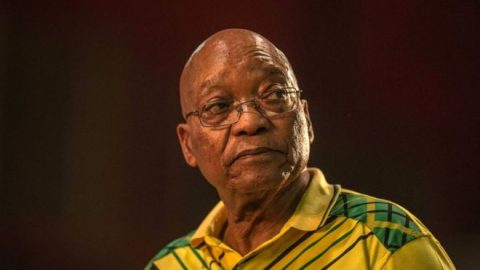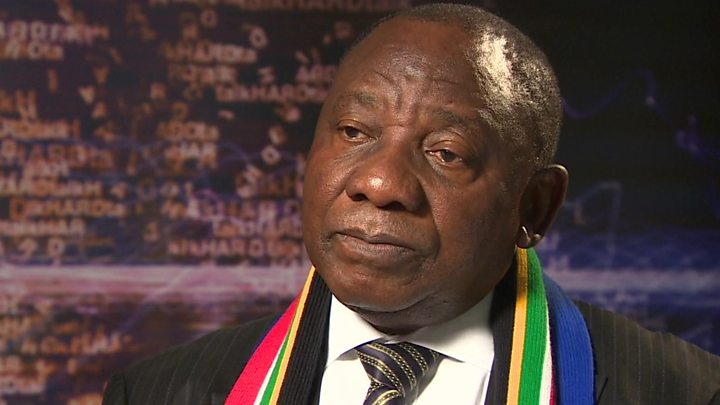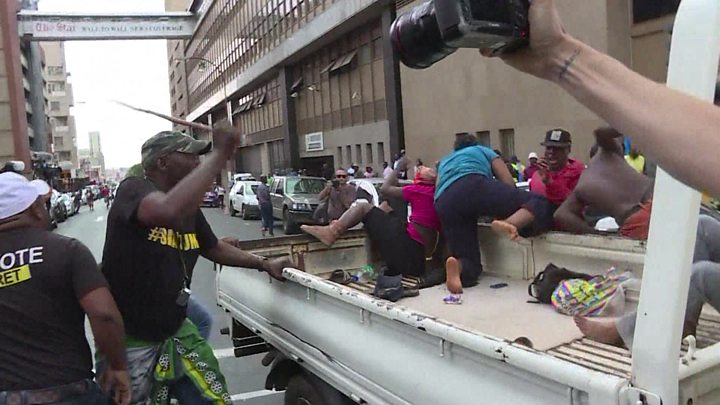
South Africa: ANC holds ‘fruitful’ talks with President Zuma
South Africa’s governing party, the ANC, has postponed a top-level meeting that was expected to decide on President Jacob Zuma’s future.
Instead the ANC released a statement saying it had held “fruitful and constructive discussions” with him.
Mr Zuma is under growing pressure from members of own party to resign amid corruption allegations.
Earlier on Tuesday, parliament took the extraordinary step of postponing Thursday’s state of the nation address.
South Africa’s Times Live website quoted unnamed sources as saying Mr Zuma was prepared to quit, if the right terms can be negotiated.
The formal National Executive Committee (NEC) meeting has been set for 17 and 18 February, the ANC’s party leader, Cyril Ramaphosa, said in a statement.
The high-level group has the power to remove the president from office without his agreement.
Opposition parties are demanding that a vote of no-confidence be held to remove him.
Mr Zuma, 75, was replaced as party leader by Mr Ramaphosa, his 65-year-old deputy, in December. Mr Ramaphosa is set to succeed him as president.

Earlier on Tuesday, the Nelson Mandela Foundation urged Mr Zuma to step down.
South Africa had seen “systematic looting” under Mr Zuma’s rule, and he “must go sooner rather than later”, the foundation said in a statement.
What was expected from the meeting?
The ANC had said it would make a final decision on Mr Zuma’s future at Wednesday’s NEC meeting.
If the ANC had decided to withdraw all their support, President Zuma would not have a majority in parliament, making it hard for him to resist.
Emergency party talks were held in Johannesburg on Sunday. Those attending were said to be largely, but not entirely, in agreement.
Mr Zuma also met top ANC leaders on Sunday. They are said to have failed to convince him to stand aside then.
Other unconfirmed reports from Sunday’s meeting say Mr Zuma asked for protection from prosecution for himself and his family.
Why was his speech cancelled?
The state of the union address – always made by the sitting president – is the main political event of the year in South Africa.
Parliament cancelled it out of concern over “calls for disruption”, according to Speaker of the National Assembly Baleka Mbete.

Mr Zuma’s office said in a statement that “the president has requested the postponement due to certain developments”.
What lies ahead?
South Africa’s elections are scheduled for 2019 and Mr Zuma cannot run again as there is a two-term limit.
- Jacob Zuma – South Africa’s divisive leader
- The Guptas and their links to Zuma
- How the president’s home has grown
Many in the ANC want him gone as soon as possible so they can rebuild the party’s standing. Mr Ramaphosa has associated himself with an anti-corruption drive.
In the 2016 local elections, the ANC lost ground to opposition groups, Democratic Alliance and the Economic Freedom Fighters.
Why is there a push to remove him?
Mr Zuma’s presidency has been overshadowed by allegations of corruption.
In recent years his links to the wealthy India-born Gupta family, who are alleged to have influenced the government through their relationship with Mr Zuma, have caused his popularity to plummet. In South Africa, it has become known as “state capture”.
Both Mr Zuma and the Guptas deny the allegations.
Then there is also the country’s struggling economy, with the unemployment rate rising to about 28%.
In brief: The allegations against Zuma
- 2005: Charged with corruption over multi-billion dollar 1999 arms deal – charges dropped shortly before he becomes president in 2009
- 2016: Court orders he should be charged with 18 counts of corruption over the deal
- 2016: Court rules he breached his oath of office by using government money to upgrade private home in Nkandla – he has repaid the money
- 2017: South Africa’s public protector said he should appoint judge-led inquiry into allegations he profiteered from relationship with wealthy Gupta family – he denies allegations, as have the Guptas
- 2018: Zuma approves inquiry






